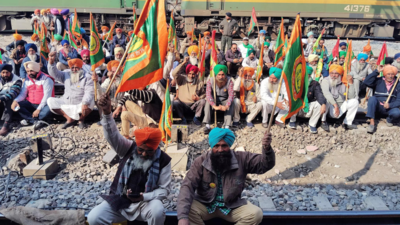
New Delhi: The Supreme Court on Wednesday said it remains open to suggestions or demands made by protesting farmers either directly or through authorized representatives.
This comes after the Punjab government informed the court that it was trying in vain to mediate with farmer leader Jagjit Singh Dallewal and other protesting farmers who are on an indefinite hunger strike at the Kanauli border.
Punjab Attorney General Gurminder Singh told a bench of Justices Surya Kant and Ujjal Bhuyan that while the state has held several discussions with farmers, they have refused to engage with the high-level committee constituted by the Supreme Court in September. The committee, headed by retired Punjab and Haryana High Court judge Justice Nawab Singh, invited farmers to meet on December 17 but was refused.
“We clarify that the doors of the court are always open to any suggestions or demands made by farmers directly or through their authorized representatives,” the bench said.
It also expressed concern over the deteriorating health condition of Dhalewal and directed the Punjab government to ensure immediate medical assistance.
Farmers reject SC-appointed committee
Protesting farmers dissolved the Supreme Court-appointed committee citing its failure to address their grievances in time. Sarwan Singh Pandher, general secretary of the Punjab Kisan Mazdoor Sangharsh Committee, said the unions at the Kanauli border collectively decided not to engage with the committee.
“Now, if there is going to be negotiations, it is with the central government, if the central government wants to negotiate,” Pandhel said, noting that farmers have lost confidence in the committee.
In a letter to Justice Nawab Singh, Dhalewal questioned the committee’s insensitivity, saying: “Is this committee waiting for my death?”
Dhalewal and the Samyukta Kisan Morcha (a non-political organization) claimed that future discussions will only involve the central government.
Farmers staged a three-hour “Rail Roko” protest on Wednesday, intensifying their unrest and disrupting train services at several locations in Punjab.
The protests were organized by the Samyukta Kisan Morcha (non-political) and Kisan Mazdoor Morcha to pressure the central government on issues such as legally binding minimum support price (MSP) for crops, debt relief, pension for farmers and workers Kim, and the police case was withdrawn.
Protest locations include Moga, Faridkot, Gurdaspur, Jalandhar, Hoshiarpur, Ferozepur, Patiala, Mohali and Sangrur. Farmers have also been camping at the Shambhu and Khanauri border points since February, demanding action on issues such as the Land Acquisition Act 2013 and compensation to the families of farmers who died in earlier unrest.







